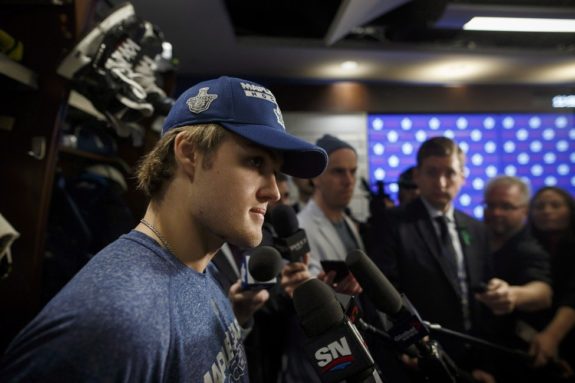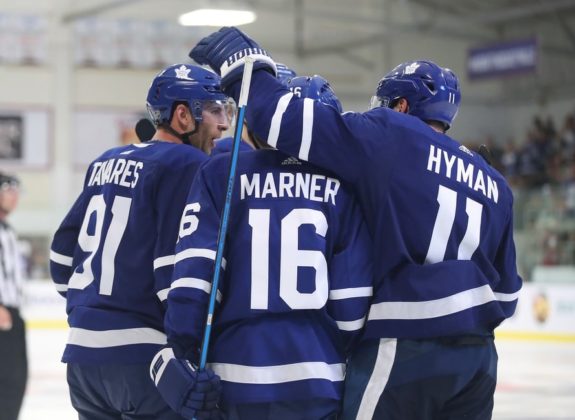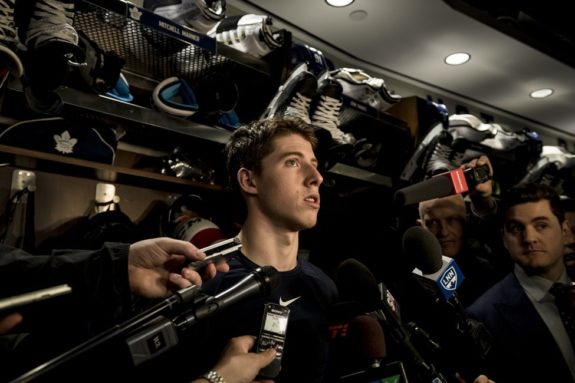I begin this post with a caveat. I have followed the Toronto Maple Leafs negotiations with restricted free agent Mitch Marner and his agent

First, let me say that I like Marner as a player, and I also care about the Maple Leafs.
In a tip of the hat to the old saying “short-term pain, long-term gain,” I believe it’s time for the Maple Leafs to quit trying so hard to sign a reluctant Marner and to make a fair, but final, offer to Marner and his agent. Then, if that offer isn’t accepted, the Maple Leafs should simply let the young forward and his agent go unpaid for a season.
Related: Can Morgan Rielly Win the Norris Trophy in 2019-20?
When I make this suggestion, I am not at all taking a “that-will-show-them” attitude. However, I am considering the best action for the team over its long-term future. From every indication I’m hearing, the two sides are simply too far apart and the demands from Ferris, and by proxy Marner, are too out-of-line with the reality of the current situation league-wide in the NHL.
The Current State of Affairs as We Know It
August has come and gone, and Marner seems no closer to signing a contract than he was at the end of last season. If hockey “insiders”
I believe nothing’s happened because Ferris has convinced his client that the Maple Leafs (a) really want Marner to play for the team and believe the team thinks it’s better with Marner in its lineup, (b) have made signing Marner the team’s first priority (that’s what Dubas has said all along, and they believe him), and (c) will cave to Ferris’ contract demands to avoid a situation similar last season’s final-second reprieve that allowed William Nylander to engage a roster spot on the team.

It would be easy to convince Marner of the first two, because both are true. Yes, the team wants Marner. Yes, the team is better with Marner on its active roster. Finally, yes, signing Marner is the team’s first priority.
All that said, I don’t think any level-headed hockey fan could deny that Dubas has turned summersaults clearing salary-cap space by trading away loyal soldiers like reluctant-to-leave Nazem Kadri. Even Marner’s friend and former teammate Connor Brown was traded to Ottawa. As well, Dubas cleverly assumed problematic contracts such as David Clarkson’s. He’s done his job.
Somehow, too, even former teammate Patrick Marleau got into the act by waiving his no-movement clause so there would be more cap space. I might be completely wrong, but no one can tell me Marleau wasn’t considering, at least in part, his young protégée and the long-term good of the Maple Leafs when he agreed to be traded to the Carolina Hurricanes so his contract could be bought out.
Exercising the Third Point
However, it’s on that third point where the team, I believe, eventually should take a stand. Here’s what I believe it should do. The Maple Leafs should outline a small number of options it believes are fair and that the team can live with, specifying these options in specific dollars and terms. Then, they should simply stick with those options. No more talking. Don’t even answer the phone. Sign, or sit.

I think, for the long-term good of the team, the rhetoric can no longer be that Dubas will sign Marner “at any cost.” Sometimes costs are simply too great. If that means Marner sits out the season; sadly, then so be it.
Pragmatic and Philosophical Reasons for this Stance
Reason One: It makes no long-term sense that the team keeps trading away assets to clear
Related: Maple Leafs Rumors: Marner & Dubas Can’t Find Common Ground
Obviously, the Maple Leafs are not the Edmonton Oilers because they literally have a handful of great players whereas, with the Oilers, McDavid, Leon Draisaitl, Oscar Klefbom, and Ryan Nugent-Hopkins are the team’s core. Still, the idea is the same – you don’t trade away all your talent for the cause of one player.
Reason Two: Obviously, NHL hockey teams have pecking orders. Simply stated, some players are more highly valued than others. That’s life in professional sports. However, it does little for team morale if one player or a small handful of players are treated like gold while others are treated like moveable “contracts.” Eventually, players are humans with psychological needs. When future players have a choice where they’ll sign, they’ll sign where they are appreciated as people.

Reason Three: Philosophically, given all other considerations, a team is poorer if it puts any individual player’s needs ahead of team needs. I believe the balance in hockey is delicate. In part, individual stars drive team success; however, players who play like individuals instead of together as a team simply don’t win. Hockey vernacular is loaded with terminology that offers insight into the nature of the game – words such as “pass” and “assist” reveal that hockey is best played using teamwork.
What Might Happen if Marner Sits for a Season?
In these negotiations, as in any other according to the NHL’s Collective Bargaining Agreement, both the team and the player are granted leverage. If Marner doesn’t believe the contract offered is fair for him, he doesn’t have to sign it. Likewise, the team doesn’t have to sign Marner to any contract his agent wishes.
Related: NHL Rumors: Maple Leafs, Oilers, Kings, Flames, More
So, what happens if a contract cannot be negotiated that seems fair to both sides? The Maple Leafs cannot play Marner, and he doesn’t get paid an NHL salary and cannot play in the NHL. The team continues to hold his rights and, should Marner wish to play in the NHL next season, the process starts again with the same people involved – unless Dubas is no longer the Maple Leafs general manager or Ferris is no longer Marner’s agent.
Marner could play in Europe, and already Ferris has alluded to that possibility by letting it leak that his client has been in contact with a team in Switzerland. However, that’s both financially small potatoes and risky business.

First, Marner’s salary would be nowhere near the salary he could get with the Maple Leafs, even on a contract he didn’t like. Second, if he happened to be injured, and hockey’s a rough game, the Maple Leafs would be under no compunction to offer him a contract next year as an injured player. That would be sad for Marner, but the Maple Leafs would save a large amount of money. That’s the way hockey is.
Marner can withhold his services from the team. But, where might he be after that process is completed? There are a number of possibilities, but let’s consider two.
No doubt, everyone believes that the Maple Leafs roster is better with Marner as part of the team. However, the team is a strong offensive force even without him. With the salary-cap space NOT signing Marner afforded, the team might find another player to fill his role. Or, Andreas Johnsson, Kasperi Kapanen, and Nylander might emerge as potential superstars who could help lead the team to its first Stanley Cup victory in over 50 seasons.
In addition, the team’s defense is as strong as it’s been in seasons. A Stanley Cup victory without Marner is certainly within the realm of possibility. If that happened, Marner’s leverage would be eroded and the team would have the upper hand in its next negotiations.

Second, the team could flounder without Marner. The Maple Leafs might even make the playoffs but be turfed once more in the first round. That would be unacceptable and, if it were to happen, Marner would hold leverage in future negotiations. That seems to be exactly where negotiations sit currently.
What’s Next?
For the reasons I’ve stated above, I believe it’s simply time for the Maple Leafs to make a number of fair and team-acceptable final offers to Marner’s camp. Then, it should stick to these offers. As I say, no more talking. Insofar as I’m able, I say this with respect to
Related: Maple Leafs News & Rumors: Marner, Switzerland, Russia & More
My biggest fear is that Toronto capitulates to Marner’s demands and the team becomes weaker for it.